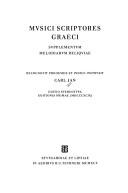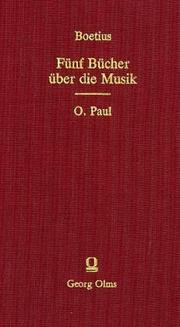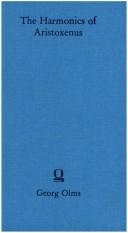| Listing 1 - 10 of 44 | << page >> |
Sort by
|
Book
ISBN: 1139814915 1108061478 Year: 1883 Publisher: Place of publication not identified : Cambridge : publisher not identified, Cambridge University Press
Abstract | Keywords | Export | Availability | Bookmark
 Loading...
Loading...Choose an application
- Reference Manager
- EndNote
- RefWorks (Direct export to RefWorks)
The German classical philologist Rudolf Westphal (1826─92) had originally studied theology at the University of Marburg before turning his attention to comparative linguistics. He learnt Sanskrit and Arabic and took a keen interest in Indo-European languages and Semitic grammar. In the late 1850s and early 1860s he joined his friend and fellow philologist August Rossbach (1823-98) at the University of Breslau (Wrocław) and later taught at Moscow's Imperial Lyceum. In this 1883 work, he gives an extensive account of melody and rhythm in ancient Greek music. Westphal is full of admiration for the philosopher Aristoxenus (born c.370 BCE), whom he hails as 'the founder of musicology'. Following Aristoxenus' distinction between melody (quality of tone) and rhythm (quantity of tone), Westphal divides his work into two parts that describe and exemplify these components in detail. His multi-volume Theorie der musischen Künste der Hellenen is also reissued in this series.
Music, Greek and Roman. --- Greek music --- Music, Greek (Ancient) --- Music, Roman --- Roman music --- Music
Book
ISBN: 0306706995 Year: 1975 Publisher: New York (N.Y.): Da Capo
Abstract | Keywords | Export | Availability | Bookmark
 Loading...
Loading...Choose an application
- Reference Manager
- EndNote
- RefWorks (Direct export to RefWorks)
Music, Greek and Roman --- -Greek music --- Music, Greek (Ancient) --- Music, Roman --- Roman music --- Music --- History and criticism --- -History and criticism

ISBN: 9783110975406 3110975408 3519017768 9783598717765 3519017776 9783598717772 3598717768 Year: 1995 Publisher: Stutgart B.G. Teubneri
Abstract | Keywords | Export | Availability | Bookmark
 Loading...
Loading...Choose an application
- Reference Manager
- EndNote
- RefWorks (Direct export to RefWorks)
Musici Scriptores Graeci: Aristoteles Euclides Nicomachus Bacchius Gaudentius Alypius et Melodiarum Veterum Quidquid Exstat (Bibliotheca scriptorum Graecorum et Romanorum Teubneriana)
Music, Greek and Roman. --- Music theory --- Music --- Greek music --- Music, Greek (Ancient) --- Music, Roman --- Roman music --- History --- Theory
Book
ISBN: 1139833537 1108061508 Year: 1886 Publisher: Place of publication not identified : Cambridge : publisher not identified, Cambridge University Press
Abstract | Keywords | Export | Availability | Bookmark
 Loading...
Loading...Choose an application
- Reference Manager
- EndNote
- RefWorks (Direct export to RefWorks)
Rudolf Westphal (1826-92) originally studied theology at the University of Marburg before turning to classical philology and comparative linguistics. He learnt Sanskrit and Arabic and took a keen interest in Indo-European languages and Semitic grammar. In the late 1850s and early 1860s he joined his friend and fellow philologist August Rossbach (1823-98) at the University of Breslau (Wrocław). This multi-volume work on ancient Greek metre and music resulted from their collaboration. Reissued here is the revised third edition published in four parts between 1885 and 1889. Volume 2 (1886) is devoted to Westphal's thorough account of melody and harmony in Greek music. He provides a general introduction to the development of Greek melody through history as well as an account of Aristoxenus' theory on intervals. The latter part of the volume focuses on the scholarship relating to harmonies and scales.
Greek language --- Music, Greek and Roman. --- Metrics and rhythmics. --- Greek music --- Music, Greek (Ancient) --- Music, Roman --- Roman music --- Music
Book
ISBN: 1139833545 1108061516 Year: 1887 Publisher: Place of publication not identified : Cambridge : publisher not identified, Cambridge University Press
Abstract | Keywords | Export | Availability | Bookmark
 Loading...
Loading...Choose an application
- Reference Manager
- EndNote
- RefWorks (Direct export to RefWorks)
Rudolf Westphal (1826-92) originally studied theology at the University of Marburg before turning to classical philology and comparative linguistics. He learnt Sanskrit and Arabic and took a keen interest in Indo-European languages and Semitic grammar. In the late 1850s and early 1860s he joined his friend and fellow philologist August Rossbach (1823-98) at the University of Breslau (Wrocław). This multi-volume work on ancient Greek metre and music resulted from their collaboration. Reissued here is the revised third edition published in four parts between 1885 and 1889. Part 1 of Volume 3 (1887), which features the input of classical scholar Hugo Gleditsch (1837-1913), discusses the distinction drawn by Aristoxenus between singing and speaking. The volume also focuses on prosody and different types of verse feet.
Greek language --- Music, Greek and Roman. --- Metrics and rhythmics. --- Greek music --- Music, Greek (Ancient) --- Music, Roman --- Roman music --- Music
Book
ISBN: 1139833553 1108061524 Year: 1889 Publisher: Place of publication not identified : Cambridge : publisher not identified, Cambridge University Press
Abstract | Keywords | Export | Availability | Bookmark
 Loading...
Loading...Choose an application
- Reference Manager
- EndNote
- RefWorks (Direct export to RefWorks)
Rudolf Westphal (1826-92) originally studied theology at the University of Marburg before turning to classical philology and comparative linguistics. He learnt Sanskrit and Arabic and took a keen interest in Indo-European languages and Semitic grammar. In the late 1850s and early 1860s he joined his friend and fellow philologist August Rossbach (1823-98) at the University of Breslau (Wrocław). This multi-volume work on ancient Greek metre and music resulted from their collaboration. Reissued here is the revised third edition published in four parts between 1885 and 1889. Part 2 of Volume 3 (1889) considers the historical development of different metres and analyses a number of lyrical and choral compositions in great detail. It also pays attention to the hexameter in drama and the poetry of Nonnus and Theocritus in particular. Also included are accounts of the structure of the Greek choliamb and of the Anacreontea collection.
Greek language --- Music, Greek and Roman. --- Metrics and rhythmics. --- Greek music --- Music, Greek (Ancient) --- Music, Roman --- Roman music --- Music
Book
ISBN: 1139833529 1108061494 Year: 1885 Publisher: Place of publication not identified : Cambridge : publisher not identified, Cambridge University Press
Abstract | Keywords | Export | Availability | Bookmark
 Loading...
Loading...Choose an application
- Reference Manager
- EndNote
- RefWorks (Direct export to RefWorks)
Rudolf Westphal (1826─92) originally studied theology at the University of Marburg before turning to classical philology and comparative linguistics. He learnt Sanskrit and Arabic and took a keen interest in Indo-European languages and Semitic grammar. In the late 1850s and early 1860s he joined his friend and fellow philologist August Rossbach (1823-98) at the University of Breslau (Wrocław). This multi-volume work on ancient Greek metre and music resulted from their collaboration. Reissued here is the revised third edition published in four parts between 1885 and 1889. Volume 1 (1885) is given over to Westphal's study of Greek rhythm, noting the contributions made by both ancient and modern thinkers. As in his 1883 Musik des griechischen Alterthumes (also reissued in this series), he pays particular attention to the fourth-century philosopher Aristoxenus, presenting the latter's theories on rhythm.
Greek language --- Music, Greek and Roman. --- Metrics and rhythmics. --- Greek music --- Music, Greek (Ancient) --- Music, Roman --- Roman music --- Music
Book
ISBN: 057110021X Year: 1978 Publisher: London Faber
Abstract | Keywords | Export | Availability | Bookmark
 Loading...
Loading...Choose an application
- Reference Manager
- EndNote
- RefWorks (Direct export to RefWorks)
Music --- Antiquity --- Greece --- Music, Greek and Roman --- Dictionaries --- -Greek music --- Music, Greek (Ancient) --- Music, Roman --- Roman music --- Dictionaries. --- -Dictionaries --- Greek music

ISBN: 3487046296 Year: 1973 Publisher: Hildesheim Olms
Abstract | Keywords | Export | Availability | Bookmark
 Loading...
Loading...Choose an application
- Reference Manager
- EndNote
- RefWorks (Direct export to RefWorks)
Music, Greek and Roman. --- Music, Greek and Roman --- Greek music --- Music, Greek (Ancient) --- Music, Roman --- Roman music --- Music --- 78.60.1

ISBN: 3487052547 Year: 1990 Publisher: Hildesheim Olms
Abstract | Keywords | Export | Availability | Bookmark
 Loading...
Loading...Choose an application
- Reference Manager
- EndNote
- RefWorks (Direct export to RefWorks)
muziektheorie --- Music --- harmonieleer --- harmonie --- Greece --- Music, Greek and Roman --- -Greek music --- Music, Greek (Ancient) --- Music, Roman --- Roman music --- History and criticism --- History and criticism.
| Listing 1 - 10 of 44 | << page >> |
Sort by
|

 Search
Search Feedback
Feedback About UniCat
About UniCat  Help
Help News
News